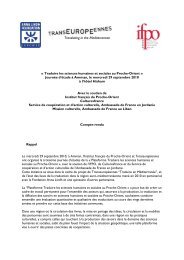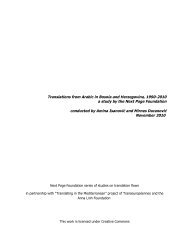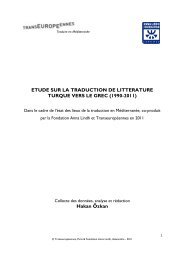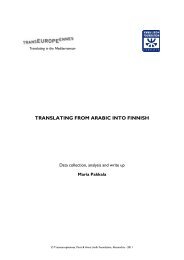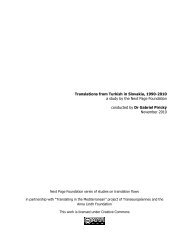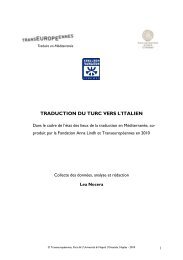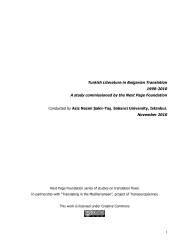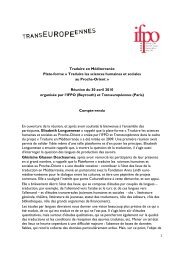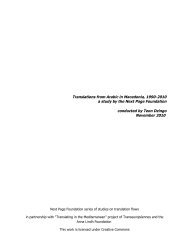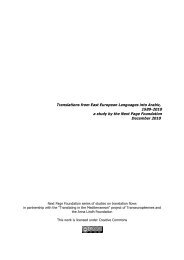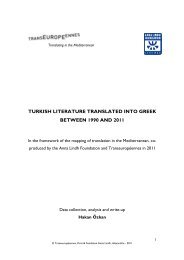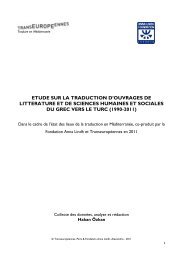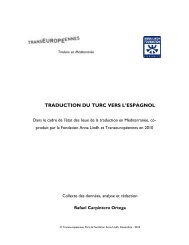Translations from Turkish in Serbia, 1990-2010 a study by the Next ...
Translations from Turkish in Serbia, 1990-2010 a study by the Next ...
Translations from Turkish in Serbia, 1990-2010 a study by the Next ...
Create successful ePaper yourself
Turn your PDF publications into a flip-book with our unique Google optimized e-Paper software.
One can notice that <strong>the</strong> traditional attitude towards Turks and <strong>Turkish</strong> culture <strong>in</strong> <strong>Serbia</strong>changes. At <strong>the</strong> moment one private television is broadcast<strong>in</strong>g two <strong>Turkish</strong> TV novels that arevery popular and help <strong>in</strong>creas<strong>in</strong>g <strong>in</strong>terest <strong>in</strong> <strong>Turkish</strong> culture, literature and life style.<strong>Translations</strong> via o<strong>the</strong>r languages<strong>Turkish</strong> literature has been ma<strong>in</strong>ly translated <strong>from</strong> <strong>Turkish</strong>. There are a few examples oftranslations via English ( 4 of 19 novels – Jedna mačka, jedan čovek jedna smrt/One Cat, OneMan, One Death <strong>by</strong> Zülfü Livaneli, Izgubljena ruža/The Lost Rose and Kad život zasija/WhenLife Lights Up <strong>by</strong> Serdar Özkan, Kira Ester/Kira Ester <strong>by</strong> Solmaz Kamuran, Poslednji voz zaIstanbul/The Last Tra<strong>in</strong> for Đstanbul <strong>by</strong> Ayşe Kul<strong>in</strong>. It is worth mention<strong>in</strong>g that <strong>the</strong> famous HalilInalcik`s scholarly work Osmansko carstvo. Klasično doba 1300-1600/The Ottoman Empire. TheClassical Age 1300-1600 was pr<strong>in</strong>ted <strong>in</strong> 1974. and repr<strong>in</strong>ted <strong>in</strong> 2003) and German (1 novel –Ubistvo u hotelu Bosfor/Hotel Bosphorus (Kitapçı Dükkanı) <strong>by</strong> Esmahan Aykol).<strong>Translations</strong> of <strong>Serbia</strong>n Literature <strong>in</strong> TurkeyThere has always been a pronounced <strong>in</strong>terest <strong>in</strong> Yugoslav literature <strong>in</strong> Turkey, morepronounced than was <strong>the</strong> case with <strong>the</strong> <strong>in</strong>terest <strong>in</strong> <strong>Turkish</strong> literature <strong>in</strong> Yugoslavia. <strong>Serbia</strong>nliterature is also better presented <strong>in</strong> Turkey than is <strong>the</strong> case with <strong>the</strong> <strong>Turkish</strong> literature <strong>in</strong><strong>Serbia</strong>. For <strong>in</strong>stance, prior to 1980 twenty-three books <strong>from</strong> Yugoslav literature had beenpublished <strong>in</strong> <strong>the</strong> time span of over 40 years. The members of <strong>the</strong> <strong>Turkish</strong> national m<strong>in</strong>ority <strong>in</strong>Kosovo and Macedonia played a significant role <strong>in</strong> translation of <strong>Serbia</strong>n literature <strong>in</strong>to <strong>Turkish</strong>.The Turks have been traditionally <strong>in</strong>terested <strong>in</strong> <strong>the</strong> novels <strong>by</strong> Ivo Andrić, Meša Slimović, MiodragBulatović, Dobrica Ćosić; comedies of Branisalv Nušić were also well received as well as <strong>the</strong>stories <strong>by</strong> Ivo Andrić, Antonije Isaković, Miodrag Bulatović, Ćamil Sijarić. 4The translations of works of contemporary <strong>Serbia</strong>n authors who acquired <strong>in</strong>ternationalreputation and fame have been pr<strong>in</strong>ted <strong>in</strong> previous two decades.Currently, <strong>the</strong> follow<strong>in</strong>g books of <strong>Serbia</strong>n authors are offered <strong>in</strong> Turkey: 54 Behçet Necatigil, Balkan Ülkeleri Edebiyatılarından Türkçeye Ceviriler, Türk Dili; Çeviri Sorunları Özel Sayısı,TDK Yay., 1 Temmuz 1978, s: 322, 126-154.12



